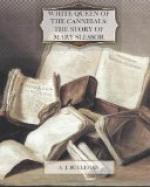“The Gospel must be preached to the people of Calabar,” she said. “Then the people ought to be taught some trades. They should learn to be carpenters and farmers and the like. We ought to send out people who can teach them these trades so that they can make a living.”
This was a new idea to many people. They wrote to other missionaries to find out what they thought about it. Later a school, “The Hope Waddell Training Institute,” was started. This school taught the boys and girls of Calabar many trades.
Mary was slow in getting well. She and Janie, the black girl she had brought with her, went to the southern part of England, where the climate was milder. It was hoped that the sea breezes and the mild climate would bring back her health. Days and weeks went by. Little by little Mary got better. The year 1891 came to an end. The bells rang in the New Year.
“Soon we can go back to dear Calabar,” said Mary. “Oh, how I want to get back and tell more people there about the Lord Jesus.”
In February, 1892, Mary and Janie sailed for Calabar. What new adventures awaited them in Africa?
“Welcome home, Ma, welcome,” shouted the people of Okoyong. “God bless you. Praise the Lord for sending you back to us!”
When Mary came back to Okoyong, things were much different from what they had been the first time she came. Now there was a fine mission house. Churches and schoolhouses had been built in many of the villages. The people were slowly but surely turning away from their heathen customs. Formerly no chief ever died without the sacrifice of many human lives, but this was not done any more. One of the chiefs said, “Ma, you white people are God Almighty. No other power could have done this.”
There were still many chiefs who liked to go to war and to fight with other tribes. But Mary had friends who would tell her of the plans of these chiefs. She would have to go to them and persuade them not to fight. One of Mary’s dearest friends was Ma Eme. When she would hear of trouble, she would send a messenger to Mary with a medicine bottle. This would mean, “Be ready for trouble.”
Mary was so good at settling the arguments between the chiefs that the British government made her a vice-consul. This was something like a governor and judge. The jungle people would not let the white men come and make new laws or settle their arguments, but they did listen to Mary. She was a very fair and honest judge. The people loved and obeyed her.
But life was not easy. Not all the natives were Christians. Even those who were, were not always good Christians but would sometimes slip back into the old heathen ways. Then it was hard for Mary and her helpers to get to the different places. There were no easy roads through the jungles, and wild animals were always there ready to kill the careless traveler.
Mary received many gifts both from the natives and from her friends in England and Scotland. One of the gifts she loved the best was a little steamboat, which the natives called “smoking canoe.” The boys and girls in Scotland had given the money to buy this boat.




